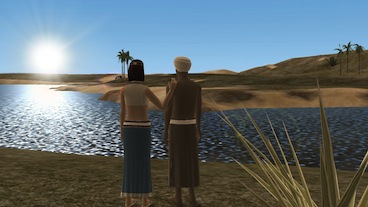
A Tale in the Desert
Set in ancient Egypt, this game recreates civilization in a persistent world driven by other players.





Release Date: February 2003
Genre: MMORPG/Adventure
I have always been intrigued by Massively Multiplayer Online Role Playing Games (MMORPGs) and have played several. I liked Asheron’s Call so much that I spent more than a year exploring Dereth. I was attracted by the social aspects of the game but grew weary of dungeon crawling, creature killing, and dying.
A Tale in the Desert (“A Tale”) takes the MMORPG genre to a new level and should appeal to those who would rather think than fight and to those who would rather create than destroy. Set in ancient Egypt, this game recreates civilization in a persistent world driven by other players. “Persistent” means that the game continues whether or not you are playing. Day turns to night, players advance, and the landscape may be altered in your absence. The most unique feature of A Tale is that there are no weapons and no beasts – a quality that will attract a special type of gamer. Unlike combat-based MMORPGs, the world of A Tale is not apt to be invaded by teenagers running wild in their search for bigger swords and better armor. For the adventure gamer, this is all great news!
To start playing A Tale, you create a character and make choices as to your gender and appearance. You begin the game on a “Welcome Island” – a safe haven that ensures new players can learn the basics with help from in-game mentors. The interface is intuitive and easy to use, with windows for conversation, inventory, and character attributes. The graphics are of medium quality and the sound is minimal, but you are provided with 360 degree panning, zoom capabilities, an overhead view, and a pop-up map that combine to give you everything you need to explore. Your first challenge is to become a citizen and get to Egypt. Since you can’t be voted off this island or swim, you must master basic skills (carpentry, spinning, weaving, etc.) in order to make the journey.
When you are ready to depart for Egypt, you have a choice of destinations. To encourage you to explore, you are allowed to teleport to 20 different places before settling. This is important, as it gives you a chance to experience various communities and talk to other players before building a base camp and establishing your place in the game world. I found that Egypt was filled with generous, friendly participants who were eager to share their knowledge as well as their inventory. I’d encourage you to visit the A Tale fan site to get a true sense of the devotion that players have to this game.
The stated objective of A Tale is “…to build the ideal community by perfecting the Seven Disciplines of Man.” These disciplines include architecture, leadership, conflict, art, worship, thought, and the human body. Each discipline has specific skills that can be learned at Universities and Schools. You develop your expertise in a discipline by passing a series of increasingly complex tests. While some tests can be completed alone, most require cooperation or competition with other players. Your character’s attributes (strength, endurance, speed, perception, etc.) are built through your advancement in the disciplines.
With A Tale, eGenesis provides a framework for players create their own game. There do not appear to be preprogrammed events or non-player characters (NPCs) that drive the story. Instead, you are given the basic building blocks of civilization and people to interact with. The results are fascinating. In some areas, guilds of players are tightly organized with planned communities and cooperative divisions of labor. In others, the landscape is chaotic – with scattered camps and little structure. In short, the game is whatever you want it to be and, by finding like-minded players, you can become part of a unique community that evolves as its members become more skilled.
eGenesis has made it very easy to test the waters of A Tale. The game can be downloaded free from their site and played at no charge for 24 hours of connection time. After that, you can choose to continue for a monthly fee of $13.95 (U.S.). This gives a new player adequate time to learn basic skills, explore portions of Egypt, and make friends before a financial commitment is required.
There are a couple of drawbacks to A Tale, which are inherent to the world of MMORPGs. Lag (delayed response time) is a battle that all developers fight when providing an online graphic environment to many concurrent users. For the most part, the response time when playing A Tale was acceptable. However, there were periods during which the lag was so bad that the game was unplayable over a DSL connection. I’m confident that eGenesis will address this and make improvements, as needed.
Secondly, to immerse your self in any MMORPG requires a substantial investment of time. This is not a game that can be played on occasion or finished in a few weeks. This is an ongoing experience that only be fully appreciated if you are willing to dedicate regular time to build cooperative relationships, explore the landscape, and develop your character.
In truth, I have only glimpsed a fraction of the potential that A Tale offers. You can’t begin to experience the complexities of this game or reap its full benefit during a review period. If I had more free time right now, I would embrace A Tale with all of my gaming heart and dive deep into Egypt. I would build great temples, solve the riddles of the Sphinx, and come to know the landscape like my own neighborhood. I would join a guild and develop that sense of community that is often lacking in my own world of busy schedules and urban sprawl. I would strongly encourage any who have the time and inclination to give A Tale a try, as it is a wonderful departure from the traditional MMORPGs and offers a host of possibilities for the adventurer.
Final Grade: A-
System Requirements:
- Windows, Linux
- 400 Mhz Pentium or better
- 192 MB RAM
- 3D Graphics Accelerator
- High Speed Internet Access

Leave a Reply